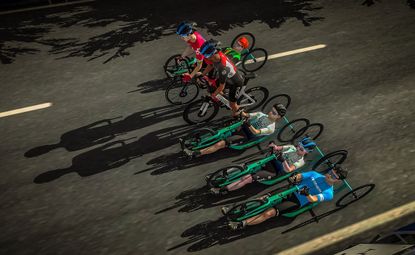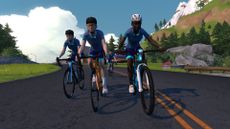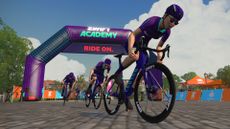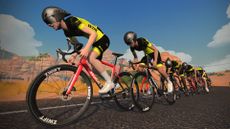Zwift will add disabled athlete representation to platform after completing large research study
The virtual cycling platform has partnered with the Challenged Athletes Foundation to launch Adaptive Athlete Representation

Zwift has confirmed it will add Adaptive Athlete Representation to the platform in the future, after partnering with the Challenged Athletes Foundation (CAF) to conduct research into disabled athlete accessibility, inclusion and representation, according to a report by Christopher Schwenkeron Cyclingnews.
Despite not committing to a specific release date, Zwift's research has focussed on all types of disabilities alongside hand cyclists, such as visual impairment, to determine how all adaptive athletes would use the platform.
Zwift's research has shown true-to-life equipment and avatar integration is essential for representation, with hand cycles, trikes and amputee avatar customisation also all needed within the app to make the product a success. With increased numbers of adaptive athletes exclusively using virtual platforms like Zwift for reasons of safety and security, the giant is facing increased calls for inclusion.
In response, Zwift said to Cyclingnews: "Our DEIB [Diversity, Equity, Inclusion, and Belonging] approach is to focus on impact at scale – ensuring that we prioritise those things that will impact the most people.
"We recently completed a large research study looking at the needs of athletes with disabilities, particularly those already in the Zwift community. The research study focused not only on hand cyclists but all types of disability to give us a better understanding of how to best tackle this area in the most equitable way possible – for all types of disability.
"The CAF was an instrumental partner in this first phase of research, and are one of our major Social Impact partners. The results of this study will ultimately help us form the product solution which is currently being discussed."
Zwift also recognises that implementing this feature is taking time, especially when considering virtual bike training platform RGT Cycling has already included disabled athletes into its cycling world. However, Zwift also realises that understanding everyone's needs is essential in delivering the best product possible and representing adaptive athletes successfully.
"We know that progress on this area has been slower than many would like. There are many vocal supporters of this movement at Zwift HQ and we hope that the product solution, when ready, will help improve the accessibility and representation for many more people on Zwift.
"We aim to improve accessibility and inclusiveness for the most people with the biggest DEIB impact. This work is focused on many different areas, including localisation because we believe accessibility promotes inclusivity."

Thank you for reading 20 articles this month* Join now for unlimited access
Enjoy your first month for just £1 / $1 / €1
*Read 5 free articles per month without a subscription

Join now for unlimited access
Try first month for just £1 / $1 / €1
Get The Leadout Newsletter
The latest race content, interviews, features, reviews and expert buying guides, direct to your inbox!
Ryan is a staff writer for Cycling Weekly, having joined the team in September 2021. He first joined Future in December 2020, working across FourFourTwo, Golf Monthly, Rugby World and Advnture's websites, before making his way to cycling. After graduating from Cardiff University with a degree in Journalism and Communications, Ryan earned a NCTJ qualification to further develop as a writer.
-
 In search of the world's best club jersey: Jubilee Park CC v Kibworth Velo Club
In search of the world's best club jersey: Jubilee Park CC v Kibworth Velo ClubEvery week we pit two club kits against each other and you get to vote on the best designs
By James Shrubsall Published
-
 'I had to wait at the top of every hill' – the highs and lows of Malcolm Elliott's career in the fast lane
'I had to wait at the top of every hill' – the highs and lows of Malcolm Elliott's career in the fast laneThroughout his two-part career, no-one epitomised Sheffield steel like Cycling Weekly's 2023 Lifetime Achievement award winner Malcolm Elliott
By James Shrubsall Published
-
 Zwift cyclist climbs equivalent of 138 Everests in a year
Zwift cyclist climbs equivalent of 138 Everests in a yearKeith Roy has broken an unofficial climbing record, totting up over 4 million feet this year
By Tom Davidson Published
-
 Zwift avatars will no longer be dependent on athlete's profile gender in latest update
Zwift avatars will no longer be dependent on athlete's profile gender in latest updateNew faces for avatars will be available across this winter, along with updates to the Zwift Companion App and a return of the Tour de Zwift
By Adam Becket Published
-
 Zwift Academy reopens for 2023 -two professional contracts are on the line
Zwift Academy reopens for 2023 -two professional contracts are on the lineThe six-ride, two-race series will run from November 6 through December 17. Contracts with CANYON//SRAM Generation and Alpecin-Deceuninck Development Team on offer
By Kristin Jenny Published
-
 23.2 million viewers watched the Tour de France Femmes live in 2022
23.2 million viewers watched the Tour de France Femmes live in 2022A new report by Nielson Sports measures the positive impact the Tour de France Femmes avec Zwift has had on the sport's growth.
By Anne-Marije Rook Published
-
 Motherhood or an athletic career? An impossible choice no more thanks, in part, due to the rise of esports
Motherhood or an athletic career? An impossible choice no more thanks, in part, due to the rise of esportsWith the rise of virtual cycling esports, world-class female endurance athletes no longer have to compromise motherhood and a professional career.
By Christopher Schwenker Published
-
 55,500 Miles Going Nowhere: Confessions of an Unapologetic Zwift Indoor Specialist
55,500 Miles Going Nowhere: Confessions of an Unapologetic Zwift Indoor SpecialistAn avid cyclist explains why, after years of logging thousand of miles cycling outside and even crossing the United States by bike, he's moved to the virtual world of Zwift.
By Christopher Schwenker Published
-
 Two epic Zwift records were set in three days
Two epic Zwift records were set in three daysRecords for most consecutive team time trails and a sub-three hour 150km ride were set in January
By Christopher Schwenker Published
-
 From straight-A student to Zwift Academy winner: Alex Morrice on her rise to the pro ranks
From straight-A student to Zwift Academy winner: Alex Morrice on her rise to the pro ranksThe 22-year-old rode her first road race in June, now she’s gearing up to join WorldTour team Canyon-Sram
By Tom Davidson Published









